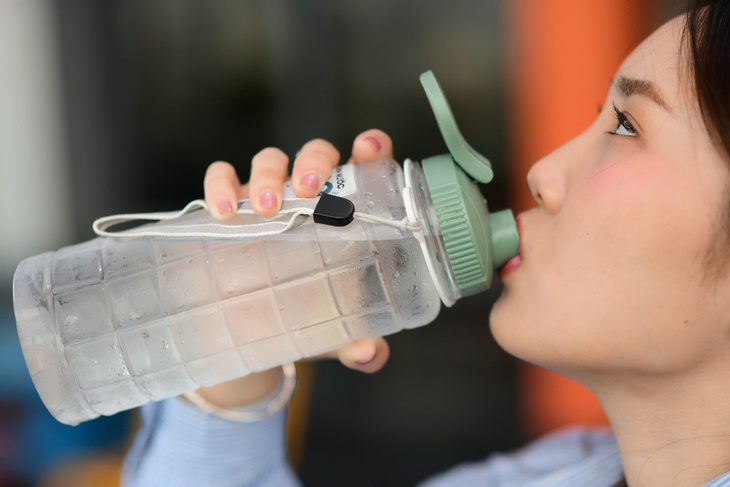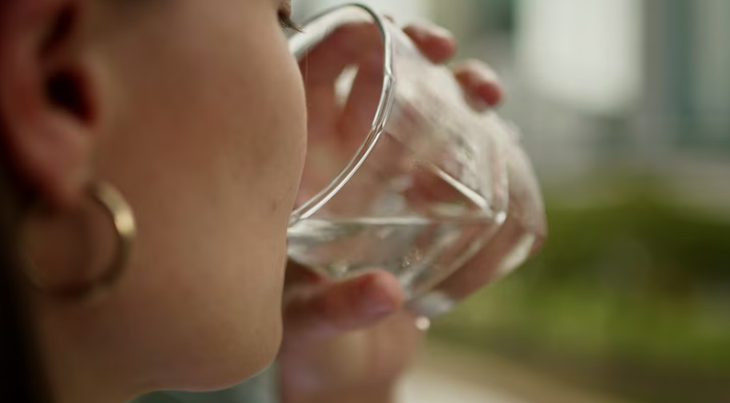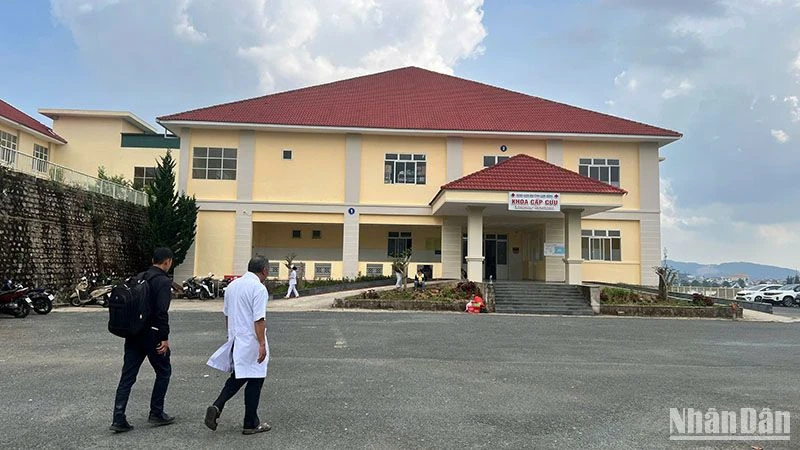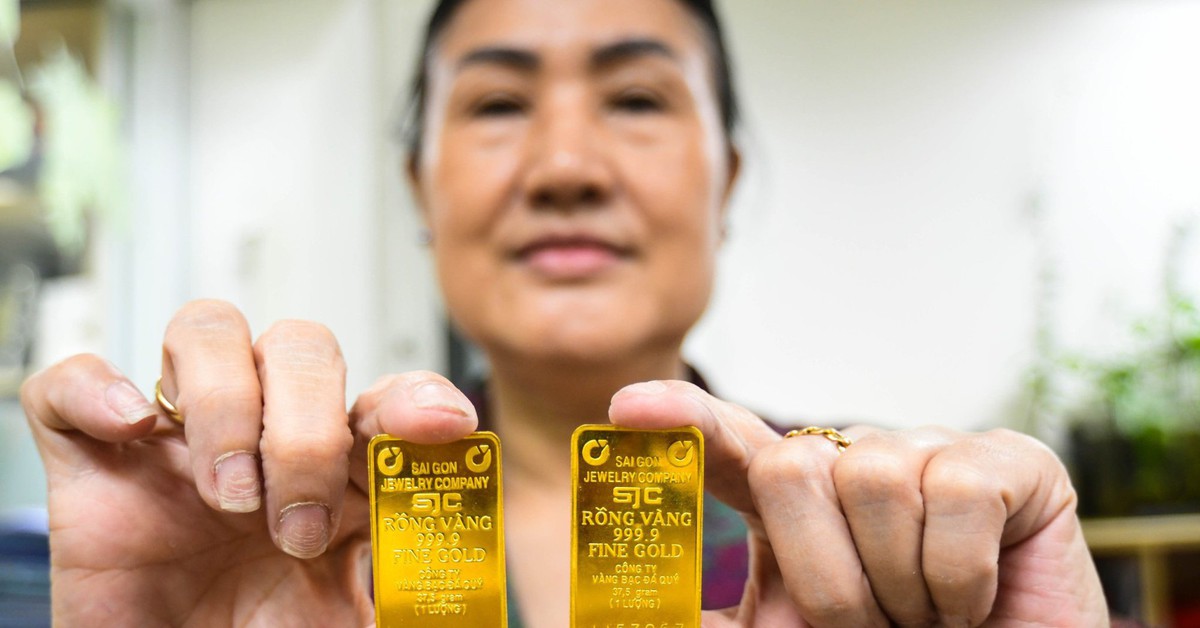
To avoid the harmful effects of dehydration, you should drink enough 1.5 - 2 liters of water every day - Photo: QUANG DINH
Water makes up 60-70% of the body, playing an important role in supporting blood circulation and regulating blood pressure. When the body lacks water, not only the cardiovascular system but also overall health can be affected.
Drink less water, more harm
Cardiovascular effects
When dehydrated, the body has to constrict blood vessels to maintain blood pressure, and this can lead to chronic high blood pressure over time.
Additionally, blood becomes thicker when dehydrated, increasing the risk of blood clots forming, which can lead to stroke or heart attack.
Kidney effects
Dehydration increases the risk of kidney stones because urine becomes more concentrated, making it easier for minerals to deposit and form stones.
At the same time, the kidneys have to work harder to filter waste in conditions of dehydration, and if prolonged, this condition can lead to kidney damage or kidney failure.
Effects on the digestive system
When the body lacks water, stool becomes dry, making it difficult to pass stool and leading to constipation. Furthermore, water helps create a mucous layer that protects the stomach, so when there is a lack of water, the risk of stomach ulcers also increases.
Causes fatigue and memory loss
The body will feel tired and lethargic when lacking water because water participates in the process of creating energy, making the body easily weakened. In addition, the brain needs enough water to function effectively, so when lacking water, the ability to concentrate and memory is reduced, and can even cause headaches and cognitive decline.
Effects on the skin
Skin will become dry and age quickly when lacking water, because water helps skin to be smooth and supple, and the lack of water makes skin wrinkled easily. In addition, when the body does not have enough water, toxins are not eliminated well, increasing the risk of acne.
Causes body temperature disorders
The body is susceptible to heat stroke when lacking water, because water plays a role in regulating temperature, and a deficiency makes it difficult for the body to adapt to hot environments.
How does dehydration affect blood pressure?
Dehydration affects blood pressure through several important physiological mechanisms. When the body is dehydrated, blood volume decreases, activating the sympathetic nervous system, causing vasoconstriction and increasing blood pressure. At the same time, increased renin secretion leads to the production of angiotensin II, causing vasoconstriction and water and salt retention, thereby increasing blood pressure.
In addition, blood thickening due to dehydration also increases blood viscosity, increases peripheral resistance and pushes blood pressure up.
Reduces blood volume, activates the sympathetic nervous system and RAA system
When the body is dehydrated, the volume of blood in the blood vessels decreases, leading to a decrease in cardiac output. To compensate, the sympathetic nervous system is activated, causing vasoconstriction and increased heart rate to maintain blood pressure.
At the same time, the renin-angiotensin-aldosterone (RAA) system is also activated. Renin stimulates the production of angiotensin II, a potent vasoconstrictor, which increases blood pressure. Aldosterone helps retain sodium and water, but in the early stages, before the body has time to retain water, blood pressure may rise due to vasoconstriction.
Increased blood viscosity
Dehydration makes the blood thicker, which increases its viscosity (blood thickness). This increases the resistance in the blood vessels, forcing the heart to pump harder to push the blood through, leading to increased blood pressure.
Electrolyte imbalance, especially sodium
When dehydrated, blood sodium levels can increase due to blood concentration. High sodium levels increase osmotic pressure, drawing water from cells into blood vessels, temporarily increasing plasma volume, but at the same time stimulating vasoconstriction and increasing blood pressure.
Signs of dehydration and how to prevent it

Drink water regularly throughout the day, don't wait until you're thirsty to drink - Photo: ABC News
When your body is dehydrated, you may notice dry mouth, dizziness, and headaches.
Rapid heartbeat and changes in blood pressure are also common symptoms.
Additionally, decreased frequency of urination and dark urine are also clear warning signs.
Elderly people and people with heart disease are more susceptible to dehydration. Outdoor workers and athletes are also at risk. Those who drink little water or are frequently dehydrated need to be especially careful.
To avoid the harmful effects of dehydration, you should drink enough 1.5 - 2 liters of water per day. Drink water regularly throughout the day, do not wait until you are thirsty to drink. You can also supplement water from foods such as fruits and green vegetables. At the same time, you should limit the consumption of soft drinks and alcohol to better protect your health.
Many patients who come to the clinic find that their blood pressure is high simply because of the habit of not drinking water, which reduces blood volume and activates physiological mechanisms that put pressure on the cardiovascular system. Drinking enough water not only helps restore blood volume, reduce stimulation of the sympathetic nervous system and the RAA system, but is also a simple way to stabilize blood pressure, protect the cardiovascular system as well as overall health.
The author of the article, Dr. Ly Huy Khanh, is currently the deputy director of general planning at Tam Duc Heart Hospital. With more than 25 years of experience, he specializes in general internal medicine and cardiovascular diseases. Dr. Khanh is also the author of many cardiovascular studies published in prestigious medical journals, and is a member of the Vietnam Cardiovascular Association and the Ho Chi Minh City Cardiology Association.
Source: https://tuoitre.vn/thieu-nuoc-ke-giau-mat-dang-so-gay-tang-huyet-ap-20250331213058208.htm





![[Photo] "Beauties" participate in the parade rehearsal at Bien Hoa airport](https://vstatic.vietnam.vn/vietnam/resource/IMAGE/2025/4/11/155502af3384431e918de0e2e585d13a)

![[Photo] Looking back at the impressive moments of the Vietnamese rescue team in Myanmar](https://vstatic.vietnam.vn/vietnam/resource/IMAGE/2025/4/11/5623ca902a934e19b604c718265249d0)














![[Photo] Summary of parade practice in preparation for the April 30th celebration](https://vstatic.vietnam.vn/vietnam/resource/IMAGE/2025/4/11/78cfee0f2cc045b387ff1a4362b5950f)





























































Comment (0)